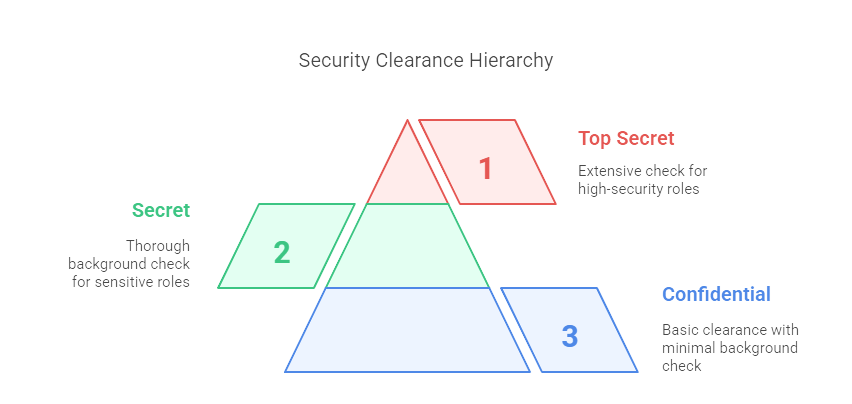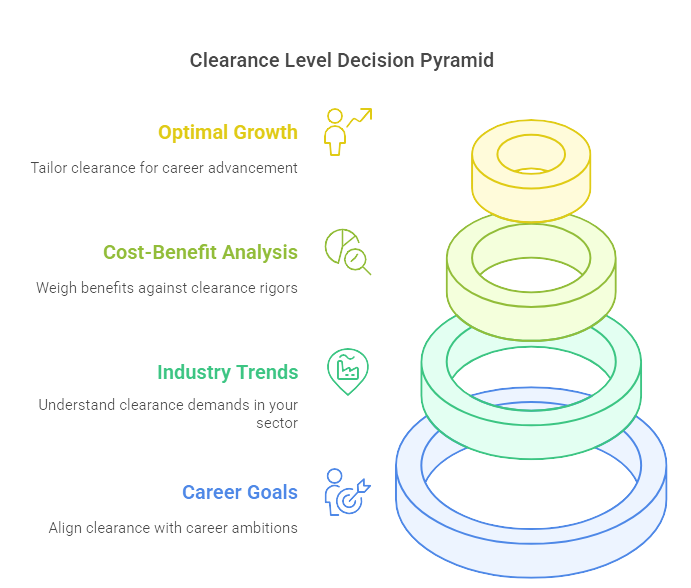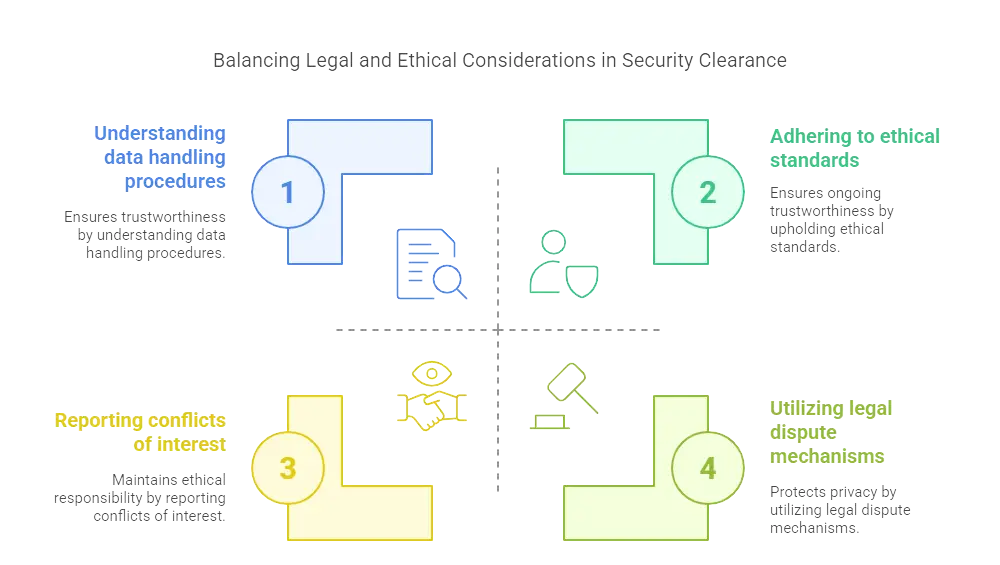Unlocking better job prospects in certain industries often hinges on obtaining a security clearance for employment. For those pursuing careers in federal jobs, defense contracting, or sensitive private sector roles, understanding the ins and outs of security clearances can be just as vital as polishing your resume.
In this comprehensive guide, we’ll explore how security clearance can shape your employment opportunities, the different clearance levels available, pathways to obtain one, and real-world examples of individuals who have leveraged their clearance to advance their careers. Additionally, we’ll provide practical tips on choosing the right level of clearance to match your career aspirations.
Key Takeaways
- Security clearance can substantially enhance job prospects by granting access to exclusive roles in the federal, defense, and private sectors.
- The three primary levels of security clearance are Confidential, Secret, and Top Secret, each offering varying degrees of access to sensitive information.
- Holding a security clearance often leads to higher salaries and expanded job opportunities due to the rigorous vetting process and trust it entails.
- Obtaining a security clearance requires sponsorship, thorough background checks, and adherence to strict protocols, with the process duration varying by clearance level.
- Legal and ethical considerations, including privacy concerns and maintaining trustworthiness, are crucial for obtaining and retaining security clearance.
Introduction
In today's rapidly evolving job market, the buzzword "security clearance" resonates with a growing demographic of professionals. Essentially, gaining a security clearance isn't just about jumping through bureaucratic hoops; it's about unlocking a realm of job opportunities that remain closed to the average applicant. Whether you're aiming for a federal job, a position with a defense contractor, or a role in private sector cybersecurity, understanding security clearances is as crucial as a well-crafted resume.
Security clearance essentially acts as a badge of trust, earmarking individuals who have passed rigorous checks on their background, character, and loyalty to safeguard sensitive information. These clearance levels — Confidential, Secret, and Top Secret — each serve to protect national interests but can also be pivotal in career advancement. Whether it's securing a higher salary or accessing exclusive job postings, holding a security clearance can dramatically influence your professional journey.
This guide aims to demystify how security clearances impact employment opportunities and explain the different levels available. We'll provide you with strategic advice on how to align the right kind of clearance with your career aspirations, supported by real-world case studies and essential tips. Your pathway to a clearance-backed career starts here.
EXPERT INSIGHT: Most of us can related to this saying: “Trust, once earned, is the currency of opportunity.” From the viewpoint of an HR professional, personally, I know that holding security clearance does more than open up doors — it sends the message to prospective employers that you're the type of individual who can be trusted at your best. In certain sectors like defense, government, and cybersecurity, it can be the difference between qualification and employment. The process is rigorous, indeed — but that is why it works so effectively. It is not simply clearance — it is proof of your integrity, your grit, and your willingness to travel where others cannot. - Charm Paz, CHRP
What is Security Clearance?
Security clearance is essentially a status granted to individuals allowing them controlled access to classified information. It's a vital aspect of employment in sectors where sensitive information must be protected, including federal government positions, defense contracting, and certain private sector roles. The purpose of security clearance is not only to safeguard national security but also to ensure that personnel entrusted with sensitive data can be thoroughly vetted.
Types of Jobs Requiring Clearance
The need for security clearance spans a variety of industries:
- Federal Jobs: Positions within government agencies such as the CIA, FBI, and NSA require clearance to access classified information.
- Defense Contractors: Companies like Lockheed Martin and Northrop Grumman often work on national security projects, necessitating cleared employees.
- Cybersecurity Roles: Protecting critical infrastructure and defending against cyber threats frequently demands cleared professionals.
Basic Requirements
Obtaining a security clearance generally involves meeting several criteria:
- U.S. Citizenship: Only U.S. citizens are eligible for most security clearances.
- Background Check: A thorough investigation into one's personal and professional history, including financial stability, criminal record, and foreign contacts.
- Loyalty and Trustworthiness: Demonstrating reliability, maturity, and ethical behavior.
- Drug Testing: Regular testing for illegal substances might be part of the process.
In summary, security clearance is the gateway to many prestigious and high-stakes positions, crucial in career advancement across several sectors.
Levels of Security Clearance
When it comes to security clearances, understanding the various levels can demystify the complexity and help you navigate which one aligns best with your career goals. Here's a straightforward breakdown of the three primary levels:
Confidential Clearance
Confidential clearance is the most basic level of security clearance. It involves minimal background investigation and is granted to individuals with roles that require limited access to sensitive information.
- Typical Job Types: Administrative positions in federal agencies, entry-level defense contracting roles, and support staff for government projects.
- Duration and Renewal: This clearance is good for 15 years, with periodic reinvestigations to ensure continual eligibility.
Secret Clearance
Secret clearance involves a more thorough background check than Confidential clearance. It is designated for roles where the unauthorized disclosure of information could cause severe damage to national security.
- Typical Job Types: IT specialists, mid-level management positions in federal agencies, defense contractors, and cybersecurity professionals.
- Duration and Renewal: Secret clearances are valid for 10 years, with mandatory updates and reinvestigations every 10 years.
Top Secret Clearance
Top Secret is the highest security clearance level and involves an extensive background check, including financial history, interviews with associates, and possibly a polygraph test. This clearance is needed for information and roles that could cause grave damage to national security if disclosed.
- Typical Job Types: Senior cybersecurity analysts, intelligence officers, high-level defense contractors, and employees working on Special Access Programs (SAP).
- Special Access Programs (SAP): SAPs are highly classified projects that require even more stringent security measures. Access is limited to individuals with Top-Secret clearance who need the specific information.
- Duration and Renewal: A Top Secret clearance is valid for five years and involves frequent reinvestigations to maintain.
Understanding these levels helps tailor your career path to meet the demands of employers looking for security-cleared professionals. Whether you aim for Confidential, Secret, or Top Secret clearance, aligning with the right level can be a game-changer in your professional life.

How Security Clearance Enhances Job Prospects
Higher Salaries
Regarding compensation, having a security clearance typically means a fatter paycheck. Employers know that candidates who have undergone the rigorous process to obtain and maintain a clearance bring a unique skill set to the table. The extra scrutiny and accountability mean they can be trusted with sensitive information, a trait many are happy to pay a premium for. So, if you're cleared, you can often expect better offers and more competitive salaries.
Expanded Opportunities
Possessing a security clearance doesn't just mean better pay—it also means more job opportunities. Many roles in federal agencies, defense contracting, and even some private sector positions require clearance as a prerequisite. This isn't confined to the beltway; plenty of firms nationwide seek professionals with clearances for crucial roles. For a detailed breakdown, you can refer to insights from USAJobs Security Clearances. The ability to transition between cleared jobs smooths career progression and makes you a highly desirable asset across various industries.
Market Demand
The demand for cleared professionals remains robust. With continuous threats to national security and the growing needs of sectors like cybersecurity and defense, the need for trustworthy and vetted employees is higher than ever. Having a clearance can, therefore, offer a significant layer of job security that is hard to find in other professions. It positions you ahead of the curve, giving you access to roles that aren't open to the general public, ensuring your skills remain in demand now and in the foreseeable future.
Tips on Choosing the Right Level of Clearance
Assessing Career Goals
First, you must align your security clearance level with your career ambitions. Are you eyeing a government job entailing access to sensitive information or perhaps a role in a defense contracting firm? Start by deep-diving into job postings in your desired field. Do they mention specific clearance levels? Often, positions in federal agencies and top defense contractors may require at least a Secret clearance, while roles involving national security may necessitate Top Secret or beyond.
Industry Trends
Staying informed about industry trends can guide your decision. For example, cybersecurity roles in the private sector increasingly ask for higher clearance levels due to rising threats and the need for stringent security measures. On the flip side, some roles in the healthcare or finance industries may only require a Confidential clearance. Conduct thorough research or consult industry reports to determine the clearance demands in your sector.
Cost-Benefit Analysis
Obtaining a higher-level clearance comes with benefits but also challenges. On the plus side, higher clearance often translates to higher pay and more prestigious positions. But the process is rigorous—Top Secret clearance involves an exhaustive background check and periodic re-investigations. Weigh these rigors against the career benefits. Will the legwork pay off in better job security and growth in your chosen field?
In essence, choosing the right clearance level involves carefully evaluating career goals, industry demands, and a personal cost-benefit analysis. Tailoring your clearance to your aspirations ensures you're neither underqualified nor overextended, positioning you for optimal career growth.

How to Obtain a Security Clearance for Employment
Obtaining a security clearance isn't a walk in the park, but it's not an insurmountable task. Here's how you can get started:
Sponsorship
First, you can't just apply for a security clearance alone. It would be best if you had a job offer or a position that requires it, because your employer or a government agency will sponsor your clearance application. Think of it as having a reliable reference who vouches for your need to access sensitive information. Without sponsorship, getting clearance is a no-go.
Application Process
Once you've secured sponsorship, the application process kicks in. Here's a simple breakdown:
- Submission of Forms: You'll begin by filling out the Standard Form 86 (SF-86), a comprehensive questionnaire that covers your background, employment history, education, foreign contacts, and financial records.
- Background Checks: Next comes the background check, which can be pretty thorough. Investigators will look into your criminal history, financial stability, personal conduct, and other relevant areas. They might even talk to your colleagues, neighbors, and past employers.
- Interviews: Expect an interview with a background investigator. This is your chance to clarify any discrepancies and provide additional context to your responses on the SF-86.
Timeline
Be prepared for a bit of a wait. The timeline for obtaining a security clearance can vary widely:
- Confidential Clearance: Generally takes 1 to 3 months.
- Secret Clearance: Often completed within 4 to 8 months.
- Top Secret Clearance: This can take anywhere from 6 months to over a year.
Patience is key. Rushing the process isn't an option, particularly for higher clearance levels where the scrutiny is considerably more rigorous.
Maintaining Clearance
Securing a clearance is just the first part; maintaining it is equally crucial. Here are some pointers:
- Periodic Reinvestigations: Be ready for periodic reinvestigations. For example, Secret clearance requires renewal every 10 years, while Top Secret is typically re-evaluated every 5 years.
- Adherence to Protocols: Follow the rules and guidelines related to handling sensitive information. Any deviation could jeopardize your clearance status.
- Report Changes: Notify your security officer about significant changes in your personal circumstances, like financial difficulties or foreign travel.
By following these steps and maintaining a clean record, you'll be well on your way to not only obtaining but also keeping your security clearance intact.
Legal and Ethical Considerations
When it comes to obtaining and maintaining security clearance, there are several legal and ethical considerations that professionals need to keep in mind. Navigating these factors proactively can ensure a smoother clearance process and uphold the integrity of the roles requiring such clearance.
- Privacy Concerns: One of the primary issues is how personal information is handled. The clearance process involves extensive background checks, which include scrutinizing personal history, financial records, and even social connections. While this is necessary to assess trustworthiness, it can feel invasive. Understand that this data is treated with confidentiality and is only accessed by authorized personnel. However, you have the right to know who handles your information and the purpose behind its use.
- Legal Protections: Several laws and regulations are in place to protect individuals undergoing security clearance checks. For instance, the Privacy Act of 1974 ensures that government agencies maintain the confidentiality of your personal information. Additionally, the Fair Credit Reporting Act (FCRA) offers protections during financial checks, ensuring accuracy and providing a mechanism to dispute inaccuracies.
- Ethical Responsibility: Holding a security clearance for employment isn't just about passing initial scrutiny—it's about maintaining trustworthiness over time. This means adhering to defined ethical standards, such as reporting any potential conflicts of interest and avoiding behavior that could pose a security risk. Remember, ethical lapses can not only lead to the loss of your clearance but also potentially end your career in sensitive sectors.
Balancing these legal and ethical considerations is crucial for anyone looking to secure or maintain a security clearance. By staying informed about your rights and responsibilities, you can navigate the process with confidence and integrity.

Conclusion
To summarize, security clearance for employment can be a game-changer for your career, opening doors to high-paying, in-demand roles in federal, defense, and private sectors. We’ve explored how clearance levels — Confidential, Secret, and Top Secret — can shape your employment prospects and discussed the pathways to obtaining one. Whether it's higher salaries or expanded opportunities, the benefits are clear, but choosing the right level requires evaluating your career goals and understanding industry trends.
If you're aspiring to advance in fields that demand high security, consider pursuing the appropriate level of clearance aligned with your career trajectory. Take proactive steps: consult with current employers or explore new opportunities where clearance is valued. Investing in obtaining and maintaining a clearance can be a pivotal move towards a more lucrative and secure career.
So, if you're ready to unlock your full professional potential, start your clearance journey today.

GCheck Editorial Team
Meet the GCheck Editorial Team, your trusted source for insightful and up-to-date information in the world of employment background checks. Committed to delivering the latest trends, best practices, and industry insights, our team is dedicated to keeping you informed.
With a passion for ensuring accuracy, compliance, and efficiency in background screening, we are your go-to experts in the field. Stay tuned for our comprehensive articles, guides, and analysis, designed to empower businesses and individuals with the knowledge they need to make informed decisions.
At GCheck, we're here to guide you through the complexities of background checks, every step of the way.






